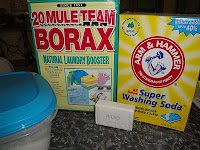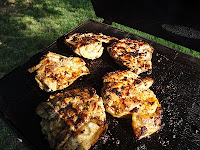I document my daily life in hopes that future generations of my family will know me well. I imagine conversations between great, great grandchildren when they reference what great, great grandma Karen had to say about that. I don't know that that will ever come to pass, but I'm putting the information out there just in case! Because I have honestly wanted to access my ancestors' knowledge, their traditions, even just daily routines. Most of that information is missing in my family.
This is Atlee and Gladys Stewart, my mother's parents.

I know that my mother was the 15th child born to her parents. And her mother was 46 years old when she had my mom. It is amazing, considering those two facts, that I even exist! My mother was only 12 years old though, when she lost both of them, within a few months of each other. Which means there is a lot that she doesn't know or remember about them. Her father was a coal miner, as most people around here were. They lived their whole lives in Mulberry, Kansas.
The coal mines here recruited people from all over the country in the early part of the century, and even in the old world, which is how we have such a large Italian and Slovenian population here. Troy's family was also a coal mining family. People in the family had always said that the Kukovich name was Austrian. We knew his great grandfather came over from Austria sometime in the early 1900's and Troy's grandpa even spoke "Austrian". But nobody knew much else, my father-in-law couldn't even remember his grandfather's first name. And trying to find documentation on him, let alone a picture, was difficult for me.
Then my brother David started an internship with the National Archives in Kansas City. He found documentation showing that Troy's great grandfather Michael and his wife Carolina immigrated in 1913 from Germany where they were living at the time. He married Carolina in Germany and also had a son, named Mike, who came to America with them. I looked up the town they came from in Germany and found out it was a mining town, so I'm pretty sure he was mining there, as he did here for a living. He probably came over with a recruiter from the mining company.
I know from his naturalization papers that Michael was born in Kazji, Yugoslavia (now Slovenia) and Carolina was born in Rabcsieze, Yugoslavia. In 1920 census papers they list their mother tongue as Slovene. I have been reading a little bit about early immigrants and learned that Slovenians would identify themselves in the United States as Austrian (since Slovenia was part of Austria at the time) to avoid anti-Slavic prejudice. And most also spoke German, which helped them assimilate in America, often working under German foremen here. I assume, because Michael and Carolina lived in Germany that they also spoke German. My mother-in-law thinks that Troy's grandpa, Michael's son, knew Italian too. He knew how to speak to a lot of the non-English speaking immigrants in the mining camp.
I still have no pictures of Michael or Carolina, aside from this photo copy from Michael's naturalization papers. I know Michael had a fair complexion, blue eyes, brown hair, was 5'9", 165 lbs and had a crippled little finger on his right hand. All of this from his naturalization papers. Thank goodness Michael applied for citizenship! Carolina never did. And I do not have a single picture of her.

Troy and I both have a longing for more of an understanding of the culture that his family came from. Assimilation was such an important thing back then, nobody thought it important to hang on to the old traditions, or even to ask questions about living in the old world. We were so interested we took a trip to Slovenia in 2008! Just to get a better taste of the culture in that part of Europe. It would have been great to also have family stories to connect to what we experienced there.
As I write this, my daughter is playing next door with a little girl who's family moved here from El Salvador. The mother does not speak English. The daughter that Alina plays with is in grade school and speaks English very well. She gets frustrated when the little sister lapses into Spanish, urging her to "Say it in English!"
Alina told me one day that they have something like grilled cheese sandwiches only better at Dianne's house, because they are made with "burrito bread", as Alina calls tortillas. I knew right away she was talking about cheese quesadillas, so I made her some for lunch. She said they weren't nearly as good as the ones Dianne's mom makes. I think the intermingling of cultures that happens in their household is pretty cool, and I hope they can hang on to it for generations to come.





































